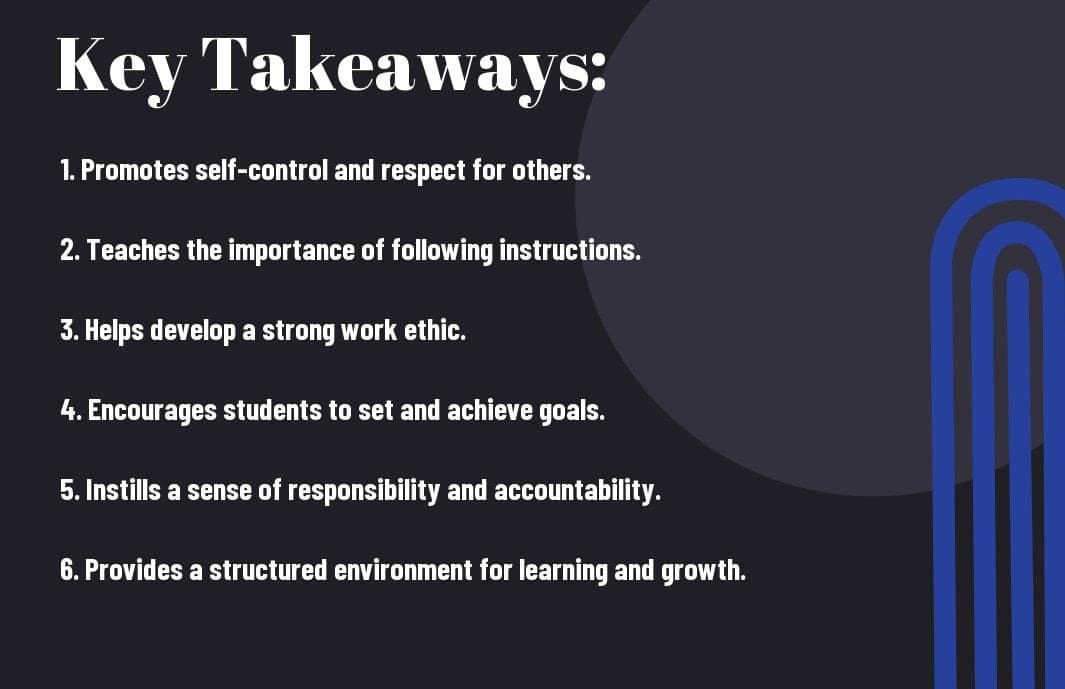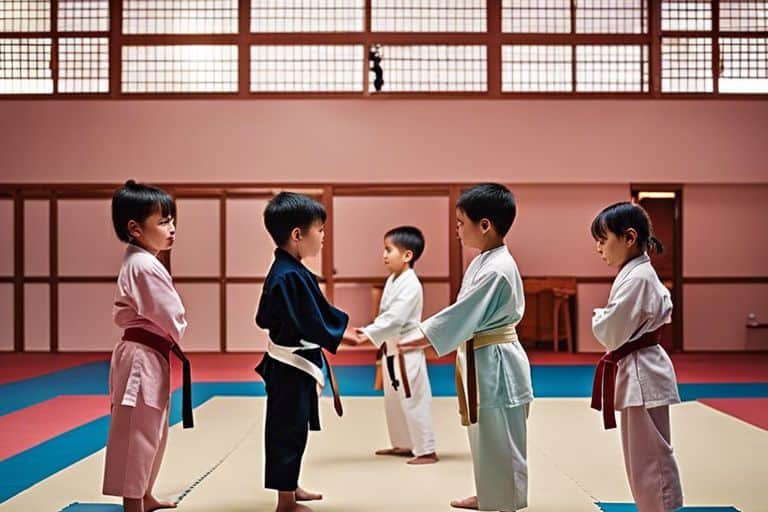Greetings! Have you ever considered enrolling your child in karate classes to promote discipline and self-control? Children’s karate classes go beyond physical activity, they also serve as a powerful tool for instilling discipline in children. Through rigorous training and consistent practice, young students learn to cultivate self-discipline and respect for themselves and others. Join us in exploring how karate can help your child develop lifelong values of respect, focus, and responsibility.
Key Takeaways:
- Structured Environment: Children’s karate classes provide a structured setting where students learn to follow rules and adhere to a schedule, promoting discipline.
- Respect for Authority: Through karate training, children develop respect for their instructors and learn to follow the guidance of authority figures.
- Goal Setting: Karate promotes goal setting, as children work towards achieving higher belt levels, fostering discipline and perseverance in their practice.
- Self-Control: Karate teaches children to control their movements and actions, improving their self-discipline and focus in all aspects of life.
- Positive Reinforcement: Children receive positive reinforcement for their efforts in karate, which helps them develop a strong sense of self-discipline and motivation.

The Structure of Children’s Karate Classes
When you enroll your child in a karate class, you are not just signing them up for physical training, but also for a structured learning experience that fosters discipline and self-control. The structure of children’s karate classes plays a crucial role in instilling these important values. According to a recent article on The Surge of Martial Arts Among Kids: Fostering Discipline …, the structure of martial arts classes for kids is designed to promote discipline, confidence, and physical fitness, aligning with the traditional principles of martial arts training.
Rank and Belt System as a Framework for Discipline
The rank and belt system in karate serves as a framework for discipline within the class. As a student progresses through the ranks, they earn different colored belts, signifying their level of skill and knowledge. This system teaches the importance of setting and achieving goals, as well as the value of hard work and dedication. The structured process of attaining higher ranks instills a sense of discipline and commitment in the students, as they understand that each belt must be earned through consistent effort and improvement. The rank and belt system creates a clear path for advancement, encouraging students to stay focused and disciplined in their practice.
The Role of Kihon, Kata, and Kumite in Teaching Self-Control
Within the structure of children’s karate classes, the practice of Kihon (basic techniques), Kata (forms), and Kumite (sparring) serves as a fundamental method for teaching self-control. Kihon emphasizes the importance of precise and controlled movements, requiring students to pay close attention to their form and technique. Kata involves the execution of a series of predetermined movements in a specific sequence, promoting mental focus and discipline. Kumite, although more dynamic, also teaches students to remain calm and composed in a controlled combat situation. Through the practice of these core elements, students learn to harness their energy, maintain concentration, and exercise self-control in their movements and interactions with others.
Behavioral and Emotional Benefits
Children’s karate classes offer a range of behavioural and emotional benefits that can positively impact all aspects of a child’s life. From improving discipline and focus to developing respect and patience, the practice of martial arts can help children grow into well-rounded individuals.
Building Patience Through Repetitive Practice
In the dojo, repetitive practice of karate techniques is a fundamental aspect of the training. As a result, children learn the value of patience as they work through each movement and strive for perfection. This fosters a sense of self-discipline and determination, which can be carried over into other areas of their lives. The ability to patiently practice and master new skills can greatly benefit children in academic and social settings, helping them to persevere through challenges and setbacks.
Encouraging Respect and Listening Skills in the Dojo
Respect and listening skills are crucial in karate classes, where children are taught to respect their instructors, peers, and the traditions of the art. Through bowing and following the etiquette of the dojo, children learn to show respect for others and themselves. The emphasis on attentiveness and following instructions also helps children develop strong listening skills, which are essential for success both inside and outside the dojo. By learning to respect others and actively listen, children can improve their communication and collaboration with peers, teachers, and family members.
The Role of Instructors and Parents
When it comes to fostering discipline in children’s karate classes, the role of the instructors and parents is crucial. Both play a significant part in shaping the attitudes and behaviours of young martial artists.
Instructors as Role Models for Discipline
As an instructor, you are not only responsible for teaching karate techniques but also for instilling discipline in your students. Your conduct and attitude serve as a model for your students to emulate. By demonstrating respect, self-control, and dedication to the practice, you show your students the essence of discipline in martial arts. It’s important for you to set clear expectations and enforce rules consistently to establish a disciplined learning environment.
How Parents Can Reinforce Martial Arts Discipline at Home
As a parent, you play a vital role in reinforcing the discipline instilled in your child through karate classes. You can do this by supporting the lessons learned in class and incorporating them into your child’s daily routine. Encouraging your child to practice self-discipline, respect, and perseverance at home helps to solidify the values taught in the dojo. Providing your child with an environment that encourages and rewards good behaviour will further enhance the discipline acquired in karate classes.
Long-Term Impact of Karate on a Child’s Discipline
When it comes to the long-term impact of karate on a child’s discipline, the benefits go beyond the physical aspect of the martial art. By consistently practising karate, children learn valuable life lessons and develop important character traits that contribute to their overall discipline.
Personal Responsibility and Accountability in Everyday Life
One of the core principles of karate is personal responsibility. As you progress in your karate journey, you will realise the importance of taking ownership of your actions and being accountable for your decisions. This sense of responsibility extends to all aspects of your life, whether it’s completing your homework, helping around the house, or adhering to your commitments.
Discipline Transference: Applying Karate Principles to Academic and Social Settings
Through regular karate practice, you will develop a strong sense of discipline that transcends the dojo walls. The principles of focus, perseverance, and self-control that you learn in karate can be applied to academic endeavours and social interactions. This will empower you to tackle challenges with determination and handle interpersonal situations with maturity and respect.
Conclusion
Upon reflecting on the benefits of children’s karate classes, it becomes evident that they play a significant role in fostering discipline. Through the structured nature of karate training, children learn the importance of self-control, respect, and perseverance. By adhering to the principles of karate, you develop a strong sense of discipline that transcends into various aspects of your life, promoting a positive and focused mindset. Overall, children’s karate classes are a valuable tool in nurturing discipline and character development.
FAQ
Q: How do children’s karate classes foster discipline?
A: Children’s karate classes foster discipline by instilling respect for authority, promoting self-control, and teaching the importance of perseverance and hard work.
Q: What role does the instructor play in fostering discipline in children’s karate classes?
A: The karate instructor serves as a role model, guiding children to develop discipline through consistent practice, leading by example, and enforcing the rules of the dojo.
Q: How do children develop respect for authority in karate classes?
A: Through bowing to the instructor, following commands, and adhering to the traditional etiquette of the dojo, children learn to respect authority figures in the karate class.
Q: What are some ways children learn self-control in karate classes?
A: Children learn self-control by mastering techniques, regulating their emotions during sparring, and understanding the consequences of their actions within the framework of karate discipline.
Q: How does perseverance and hard work play a role in fostering discipline in children’s karate classes?
A: By facing challenges, consistently training, and striving for improvement, children in karate classes learn the value of perseverance and hard work, which are foundational aspects of discipline.
Q: How can parents support the development of discipline in their children’s karate training?
A: Parents can support their children’s discipline development by reinforcing the values taught in karate classes, encouraging regular attendance, and modelling respectful behaviour at home.
Q: What are the long-term benefits of discipline fostered through children’s karate classes?
A: The discipline instilled in children through karate training can positively impact their academic performance, social interactions, and preparation for future challenges in adulthood.



